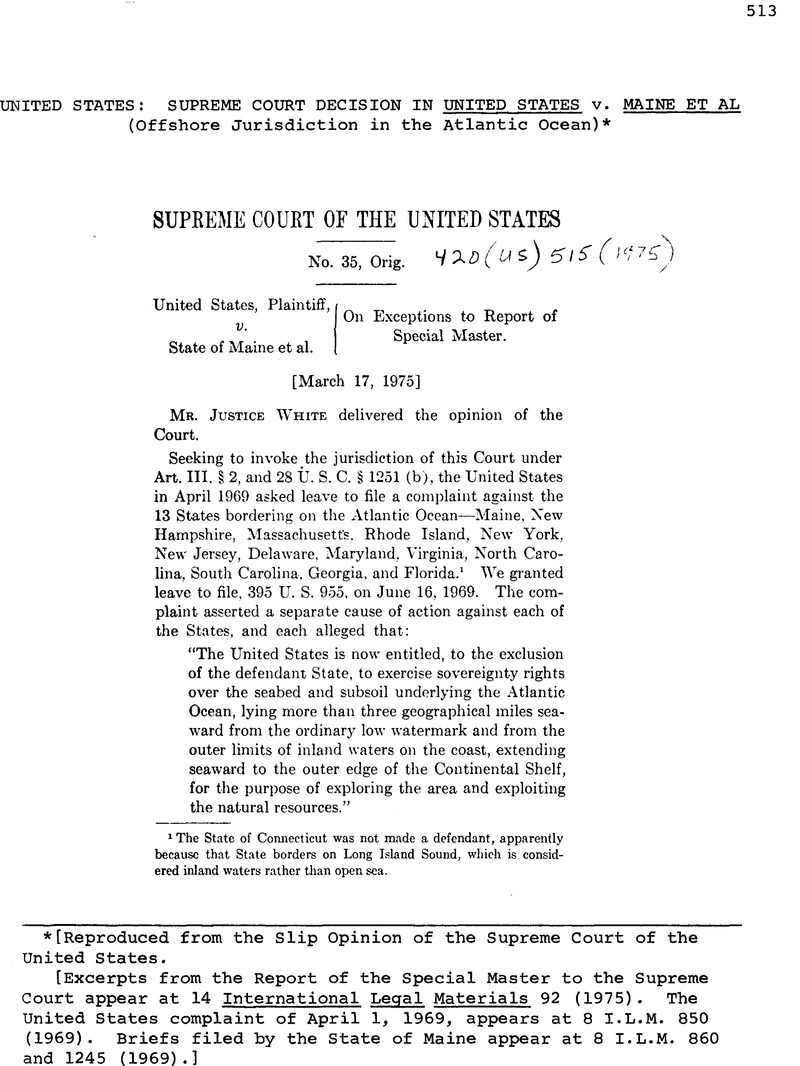No CrossRef data available.
Published online by Cambridge University Press: 04 April 2017

[Reproduced from the Slip Opinion of the Supreme Court of the United States.
[Excerpts from the Report of the Special Master to the Supreme Court appear at 14 International Legal Materials 92 (1975). The United States complaint of April 1, 1969, appears at 8 I.L.M. 850 (1969). Briefs filed by the State of Maine appear at 8 I.L.M. 860 and 1245 (1969).]
1 The State of Connecticut was not made a defendant, apparently because that State borders on Long Island Sound, which is considered inland waters rather than open sea.
2 The United States also demanded an accounting for all sums that the States may have derived from the area in question. This claim the Special Master recommends be denied for failure of proof. The United States does not except to this recommendation, and we approve it.
3 The State of Florida claimed that by virtue of the Act of June 25, 1868, 15 Stat. 73, Congress had approved the maritime boundaries for that State which at certain places included more than three miles of the Atlantic Ocean and had thereby granted to the State all of the seabed within those boundaries. Florida also claimed in its answer that the Florida Straits were not in the Atlantic Ocean as claimed by the United States but in the Gulf of Mexico. Subsequently, the controversy between the United States and Florida was severed and consolidated with the proceeding in No. 9 Original which was then concerned with the seabed rights of the State of Florida in the Gulf of Mexico; 403 U. S. 949, 950 (1971). The consolidated proceedings were given a new number—:Original 52. We have acted on the Special Master’s Report in that case. See ante, p. —.
4 The States of Rhode Island, North Carolina, and Georgia each submitted an addifional special defense applicable only to itself. We agree with the Special Master’s rejection of these special defenses, and they will not be mentioned further.
5 The Submerged Lands Act was held constitutional in Alabama v. Texas, 347 U.S. 272 (1954).
6 S. Rep. No. 93–1140, 93d Cong., (1974).
7 86 Stat. 1280 (1972). For a summary of legislation affecting the Outer Continental Shelf, see Outer Continental Shelf Oil and Gas Development and the Coastal Zone, A Report for the Committee on Commerce, United States Senate, 93d Cong., 2d Sess., 55–58 (1974).
8 Id., at 5.
9 We have long held that the doctrine of stare decisis carries particular force where the effect of re-examination of a prior rule would be to overturn long-accepted commercial practice. See, e. g., M’Gruder v. Bank of Washington, 9 Wheat. (22 U. S.) 598, 602 (1824) ; Rock Spring Distilling Co. v. W. A. Gaines & Co., 246 U. S. 312, 320 (1918).